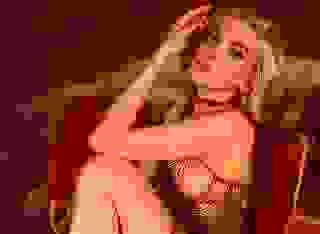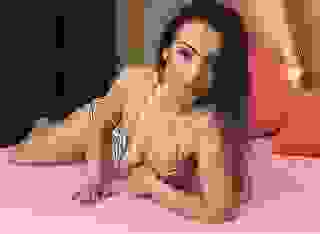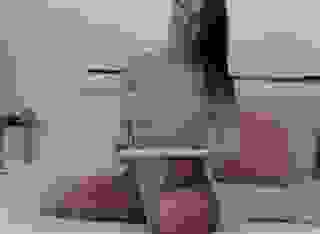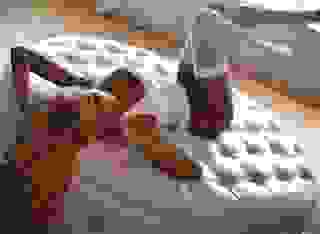Note: You can change font size, font face, and turn on dark mode by clicking the "A" icon tab in the Story Info Box.
You can temporarily switch back to a Classic Literotica® experience during our ongoing public Beta testing. Please consider leaving feedback on issues you experience or suggest improvements.
Click hereAs we enter the courtyard of the Chateau, it appears our escort of about four and twenty men is already standing by their saddled mounts, their Chevalier already amounted, in iron armour including extravagant plumed helm in iron as black as Alwen's mother's caldron, the one we use daily at Oaklea inn for pottage, and his armour overthrown with a dark blue silk cloak. We line up in front of them and bow in greeting. As we stop, the men at arms, over twenty of them, emerge from behind their mounts with short bows already charged with arrows ready to fire. Each one of us is aimed at by two or three archers.
"What is this?" my father cries out in Norman French.
The Chevalier replies in his own Norman French, most of which I understand, "The King is deposed, we have a new Duke, the rightful Duke of Normandy, Duke William Clito, son of Duke Robert, and William III will be the next King of England. We are to arrest you in the name of the new Duke. Surrender your weapons, including your strange toy bows."
"My King is still your Duke," my father insists in the local lingo, but turns to us in English, "throw your weapons on the ground. This will not hold us up long, I trust." He glances very briefly at Father Andrew, with whom he always seems to be able to share thoughts with or without speaking.
Father Andrew replies with a whisper that carries, "Not too long, Sir, but the response can be unpredictable."
"A short rest'll do us no harm. Let us dismount once we are disarmed and offer no resistance to our captors."
Our arms are piled in one spot and our horses are led away to one side of the courtyard.
"Ten horses but only nine riders?" the Chevalier barks in French.
"I am twice the size of everyone else in the party," Father Andrew responds in what sounds to me like perfect Norman French, "so I need a spare horse."
"Naturelment," the Chevalier appears satisfied, "take them all away to the dungeons."
Our hands are tied together in front of us and we are dragged across the courtyard to a door, inside the room, our arms and riding cloaks are dumped on trestle tables and we are frogmarched down steps in the corner of the room to the dungeons deep below, some three or four sets of stairs down into the dark.
They have a huge fat guard in the dungeon, his face so pale in the flickering yellow light of the torches carried by the men at arms that it seemed to me that the Gaoler is as much a prisoner as anyone else kept down here. He opens a dungeon door, one of several available.
"Nine?" He counts us off with a stabbing finger. "Room for nine here in this cell and nine more aplenty," he gloats to his blue-cloaked Chevalier.
"Search them for weapons," the Chevalier rasps, and the gaoler starts patting us down, sending Father Andrew and the four squires into the cell first after satisfying himself that they be armless.
Then he wanted to pat down my father next, but Will waves Lady Alwen through in front of him. The gaoler grabs her arm roughly and starts patting down Alwen but he is far too overzealous for my father's patience and he pulls the fat man off, and tosses him to the ground. Instantly we are surrounded by guards threatening us with spears and swords.
The Chevalier says, "Stop! You, gaoler, you handle the Ladies too much, we are instructed not to harm them, at least for now. Let the Ladies through and search these last two men."
The gaoler stands up and dusts himself off. He lets Ladies Alwen and Elinor through the doorway without further touch. He handles my father a little rougher than I, but soon we are inside and the heavy door, with a few small bars in a tiny window cut into the top third, is slammed shut and locked tight behind us with a large iron key attached to a ring in the gaoler's straining belt. The torches march away and we are plunged in near darkness, only one guttering tallow light burning on the gaoler's table.
"So where the Hell's Hugh?" I hiss to my father.
Chapter 9
When the shoe fits
It was a while before Hugh explains his absence from the Chateau's courtyard to me.
"I had a feeling that if I was to profit from this venture, while you heroes negotiate our escort to the King's palace, or hunting lodge, if that was our destination, I thought I would play some horseshoes with the stable lads and make the trip worthwhile. No building up the pot, just a quick game to breed my few English silver pennies with the silver deniers of Normandy and France.
"Me and Old Smithy take these Norman and French deniers as penny payments at the smithy, they are slightly bigger and of a finer silver than English coins, or at least they was until last year. We can only get rid of them deniers in Barton town, where they have more Normans and foreign merchants upon the high road. Rumour has it that King Henry was so pissed off about the debasement of the English coinage last spring that he summoned the worst of the moneyers to his court and cut off a hand and a testicle of each one! The new coins out of all the mints are much better, near perfect, and they bin take old coins fer new. King Henry is the man to get things done aright, and I were pleased that I'll be meeting him again in a few hours.
"The winnings in Canterbury town cathedral stables only settled my bar bill, Rob. Your father Sir Will and Lady Alwen generously offered to pay my accommodation and stabling costs if I'd accompany them, but I have other expenses in these two weeks that I have taken off work. Old Smithy wants me to buy his forge so he can retire, by paying him so much a week out of my wages to buy the equipment and tools over the next few years. And I need to rent my own place after they move away as I use a bed chamber in their house and Mrs Smith makes my break-fast and eventime dinner.
"I noticed the stables as we climbed the hill to the chateau from the port and whispered to Father Andrew that I was slipping away to try my luck. He grinned and held my bridle while I slipped off unnoticed. 'Half hour only,' he warned quietly, and I nodded back. He may be a priest, but he's more a man than most clerics passing through what needs new horseshoes.
"I had to walk around the castle walls to get to the stables, wasting ten of the thirty minutes Father Andrew warned me I had the token time of. There was a still warm forge by the stable, no one about, but the new shoes the smith was amaking there took my interest. They was made from a finer metal than the pig iron we gets from Brummigan Iron Mill, it was brighter, lighter and the shoes made thinner but stronger. I selected three new identical shoes and weighed them up individually in my hand. They were nicely balanced throwing shoes.
"You know, Rob, how you breathe as you aim an arrow at a target and, as your grip draws the string taut and you pull the arrow feathers close to your nose, anyone watching ye can see you making those slight adjustments to the pitch and angle as you calculate the distance and assess the airs around you which influence the flight after the release. Then you empty your lungs and, with your every muscle tuned into producing the right twang of delivery, the spinning of the dart driven by the feathers which help drill through the air, all leading into the heart of the target. You barely think about it consciously, it is all in the gut and memories of the muscles and sinew involved. It is like I am with the spinning of the horseshoe to the target, getting distance and spin right so the shoe is open at the heels when it reaches the spike, then turns enough so it wraps around the spike. When the toes strikes the spike, all the force behind it is distributed around the shoe so it doesn't bounce out and away and spoil the throw.
"When I left the forge and entered the stable I found only one lone stable boy mucking out one of the stalls, not good for competing against, you need three or four fellows showing off to each other to get a good pot going quickly. I hailed him with a simple good morning.
"'Tu parle anglais?' he said back to me..
"'Oui,' I replied, and then he bloody well charged me with his pitchfork aimed right at my chest. I thought little of it but threw one of the horseshoes I,carried at his throat. It stopped him in his tracks, his head snapping back. I swear, in that empty stable, I heard his neck break with a sickening sound that almost made me heave and bring up my break-fast.
"Then I heard someone running back to the forge behind me. I quickly dragged the poor lad back behind some bales and hid myself, just peering over to see what I could see and be ready to start arunning if the alarm was to be raised.
"It was the smith, returning with a pail of water to put out the flames in his forge. He was gone in an instant and then I heard a large number of horses in the courtyard start to walk away towards the exit. I thought that you had all done your business, Robin, and was leaving me behind. I covered the body with a horse blanket and covered that further with loose straw and then ran out into the courtyard in front of the stables.
"I saw the last of the horsemen duck down and pass under the partly lowered portcullis and ride off. Damnation! I thought that I had missed you! Then I noticed our horses, the fresh ones we rode up from the docks, left by the side wall, still saddled up and eating oats and drinking from pails of water what was left out for them. As I walked towards them, I heard a shout behind me, I turned and there was a black-clad Knight, in a plumed helm, mounted ahorse with shield and lance at the ready.
"He said something in Norman or French that I didn't understand, so I shrugged and said something like 'I don't speak Norman lingo, Sir,' you know, to be as polite to the Knight as becoming a humble smith, and he levelled the bloody lance and spurred his horse on to charge me,just like the stable boy did.
"Now, Rob, honestly what could I do? I was trapped by our horses behind me and had no time to get behind them, so I worked out the distances, the height he stood off the ground on his mount, his motion up and down as he rode, the spin cycle of the horseshoe and, when I judged aright, spun away the horseshoe and readied myself to throw the last one within a breath and a half, which was all the time I had left.
"It was as if time slowed down to where you could see the wings of a kingfisher beat as if the air was suddenly as solid around it as the gelatine drained off a pot of horse's hoofs you use to glue goose fletchings on your darts. 'Twas the same for that horseshoe. The horseshoe spun towards the knight, both of us committed, him to the charge and me to the throw. Spinning slowly, the heels of the shoe entered the eye sockets in the black iron helm as if guided by an avenging angel, and the toe clanged with a ring against the nose guard and the shoe would go no further into the Knight's skull.
"The scream from the Knight was unworldly, Rob, a horrible scream the like of which will wake me at night. It was like the dog which myths tell us guard the Fiery Gates of Hell, that the hound has just discovered that his tail was afire. The Knight dropped his lance, his shield, his reins and tried to claw at his face with his iron gauntlets. His mount's ears were up, unnerved by the horror of that unnerving scream. The horse sensed the Knight's knees and reins no longer directed him to charge at me and the other horses, so he veren to the right and headed for the open gate.
"The Knight could not see the portcullis that the other riders ducked under and his mount drove him straight into it at full mad stampede gallop. The force unseated the Knight but his iron boots were firmly tucked into the stirrups, so as he was dragged off his mount, he pulled the panicking horse off his hoofs and they both crashed sideways to the ground. I knew I was in serious trouble, Robin, real serious. In a foreign land, two murders at my hand, one of them a bloody mounted Knight, although I would argue that it was self defence using objects not strictly classed as weapons. But at least I could save the horse.
"I ran over and cut the cinch girdle and the horse was able to get up without his burden and gallop off. It was only then I thought, if it catches up with the men that left, they would return to discover what happened to their Knight. And the murder weapon was stuck fast, there'd be no taking off his helm and putting this Knight back together agin. There was blood and brains running out of his helm. I had to get away and fast. Our horses were saddled up, but then I thought where were you fellows? Why was I attacked, twice? Why was no one coming to the courtyard to hear the screaming, which was thankfully stopped? Even 'The Good Tern' must've heard that scream in their sleep, as would every bloody hound in South Normandy.
"I saw the open door in the tower and headed for it. Your weapons were on the table, but no dinner were laid for us. The upper rooms were silent, no one had come down that way, so I headed down the stairs. I could hear a deep rumbling voice calling out in Norman French. I know nothing of the lingo, but I know what cursing is in any tongue, so I trod soft, as it sounded like he was berating you, but you were not biting by calling back. Why?
"Then it hit me. Father Andrew knew I was free if you were captured by an enemy and incarcerated, then I was the only one around to rescue you. So I careful trod the dark steps down and down, round and round in pitch black, until I saw the flicker of light and knew that I was close. He had stopped berating you by then and I heard a chair scrape across the stone flags and the sigh of your gaoler sitting.
"I had heard only one person move or speak, and I had but one shoe and my meat knife as weapons about me. The knife was one I forged myself in my second year apprenticeship, beaten and tempered and sharp as a witch's tongue and perfectly weighted for throwing, if there was a second guard in my way. The light was dim and the gaoler broad when I espies him, but I had my shoe in my hand aready as I reached the floor of the dungeon. To hit him in the throat with the toe I would need to let fly after he or I moved six more steps closer. I could see Alwen's face dimly lit in the square hole cut in the dungeon door. She watched silently as I stepped forward but she held out a knife should I need it. It looked like the Scottish ankle knife of Lady Elinor that she has shown us before, Rob. The gaoler must've missed it.
"I tapped the horseshoe on the stone column by the steps and said something like, 'Hail, gaoler, did you forget about little me?' The fellow turned, scowled and rose slowly from his chair. Zooks! He was a giant! I planted my feet firmly and readied myself. He lumbered towards me as I counted steps, rechecking the distance in the poor light, then threw my horseshoe. He tried to duck, so instead of it hitting him in the throat, which would have silently closed his windpipe and killed him quiet like, the shoe hit him on the lower jaw and slid up past his lower teeth and made a lot of noise as jaw shattered and teeth flew everywhere before his head snapped back and severed his backbone. It was so sudden. He stopped moving for a moment in shock until he collapsed like a sack of miller's grain onto the flagstones.
"'Quick, Hugh, his keys are on his belt!' Alwen cried from the hole in the cell door.
"So I did her bidding, cutting the keys away from his belt and set you free. That is why I innocently set out to toss three horseshoes around a spike to earn my next tavern drink and I end up with three bodies. Just don't leave future rescue missions to me, Robin, I will not be so lucky next time. But at least I checked out the anvil again on our way out and took away a nice set of shoes for future games. I won't need to buy a tavern ale again!"
Chapter 10
Falaise without fail
It is Lady Elinor who marshals our thoughts before we leave Chateau le Caen.
"On a gentle gait of that of a military horse, we would expect to do the 30 English miles to Falaise in about eight or ten hours, with a couple of short rests for the horses. All our horses are used to riding long distances and carrying much heavier armed Knights or packaged loads than us, so I would expect us to reach Falaise in less time, six to seven hours. They will not be expecting us, as they believe we are still locked in the dungeon, but if we delay, we may be overtaken if any messengers are sent after Hugh's handiwork here is discovered. It is a well kept and straight road, and we should hasten and keep a sharp eye out on the road for what is behind us, because carriers may rehorse messengers with fresher mounts at inns along the way. In six hours it will be starting to get dark and we will be tired. An hour's rest within easy reach of Falaise may mean we arrive fresh enough to fight, leaving Alwen to look after the mounts in case we need to retreat, otherwise we rest up awhile and sneak in before dawn. I do have a key to the main gate if we need it."
"I think we should go in just before dawn," spake Will Archer, "Get as far as we can today before camping without a fire, and rise well before dawn."
There are general nods of agreement.
"Check what food is here, bread, meat, fruit," Sir William continues, "so we can find what we can eat cold this evening. As for Hugh, he has done us proud, getting us safely out of the dungeon. It means that being free we can still save the day. William Clito was this Chevalier's choice of Duke or King, but that cowardly youth will not venture into Normandy until his ducal ring is secure. If that happens and he wins the crown of England, he will be the vassal of the Kings of France. The Normans are few in number, and barely more than three thousand live in England and Ireland, so two million Saxon and Celtic influence in our island is still strong and we will win back control of our own destiny in the long run. But France has the biggest population in Europe, five of six times'
England's and they are eager to expand. They will swamp England like the Saxons did the Bretons, and drive out our individual nations, as the Franks already have with the Aquitaines, the Liguria, Gallia and Burgundians."
"So you're saying the French will bury us?" Hugh asked.
"Aye, more so that the Normans, where even among Knights and Earls, some Saxon and Welch maintain a presence. We hope that we can be back in control of our own lands in time and the Normans be absorbed."
We start to ride as hard as I have experienced the Black Knights ride on the few occasions I was asked to ride with them in the six months since I was knighted. After we rode out of the town, keeping an eye out for any response from the locals, but even as well armed as we were, and accompanied by two ladies, one clearly more militarily dressed than the other, we were barely given a second glance. I ponder whether to announce my elevation to the ranks of chivalry. I decide to speak to my father, so I ride up next to him.
"Father, may I speak quietly with thee?" I ask.
"Aye, son, do you want to use a little of the Welch tongue I taught you?" He smiled, knowing how I struggled with the native tongue of my forefathers, coming so late to it, already 17 when my father came back into my life.
He and Father Andrew, during my childhood, tried to enlarge my knowledge of the tongues we use or encounter every day even in local towns like Barton. Latin is a universal language that Christians share, English is the common tongue around where I live, although there are different variations and a range of accents all over. There is French or Norman French but there are few native speakers of those tongues in my area. Welch is quite common in the West Midlands, the tongue of my father and my natural mother. I have learned but a smattering of them all.








